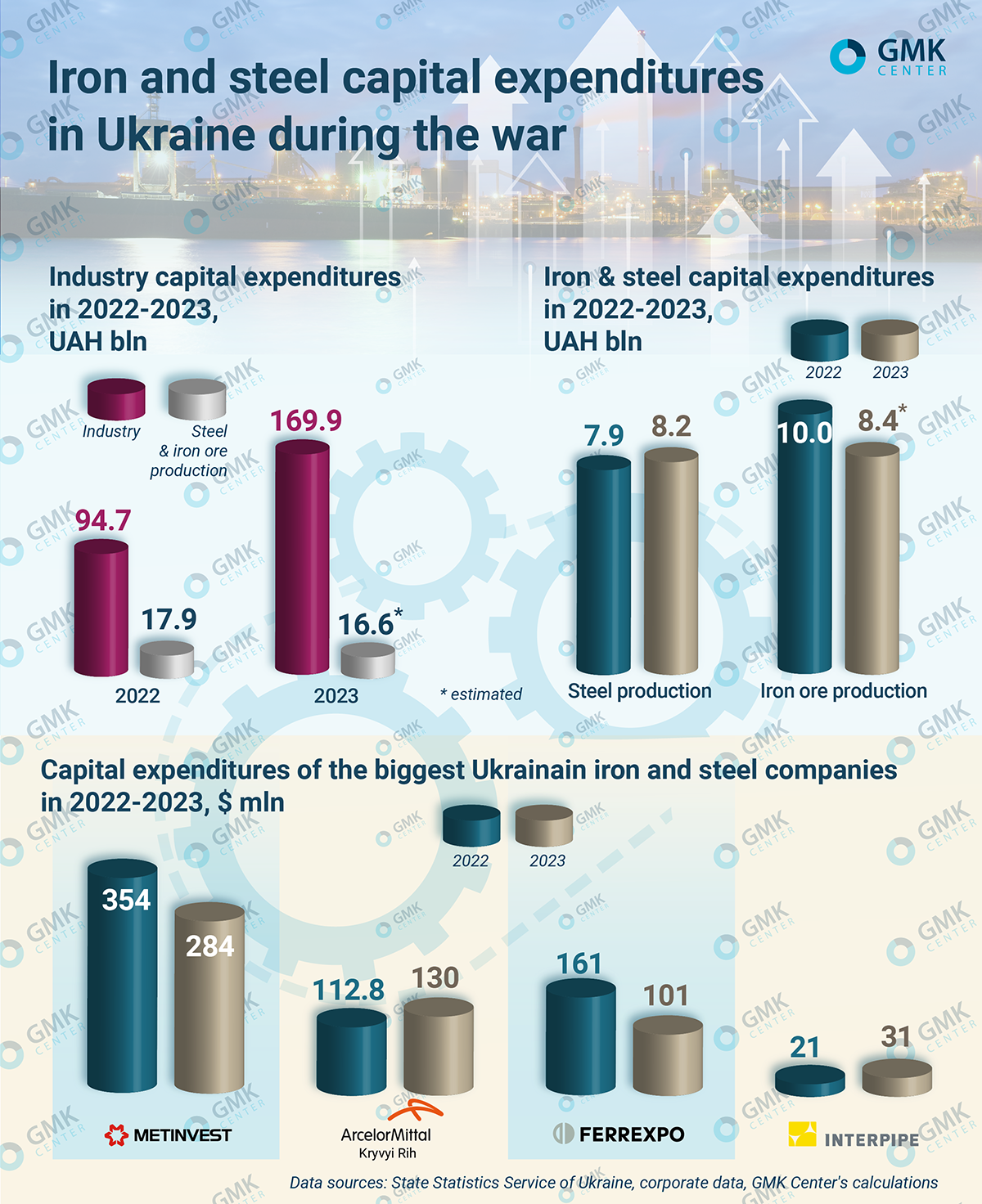Doing business

After a difficult 2022, investment activity in Ukraine is starting to recover. In 2023, the total volume of capital investment in the country increased by 41% y/y – to UAH 395bn, in industry – by 79% y/y, to UAH 170bn. However, the pre-war level of investments will be out of reach for a long time, and the current growth is partly caused by inflation and devaluation of the national currency.
Ukrainian steel industry is one of the most affected industries by the Russian invasion. As a consequence of the war, the number of steel mills has halved to 6 from 12 in 2013, with nominal steel production capacity falling from 42 million tonnes to 17.8 million tonnes now.
However, despite all the wartime difficulties, the Ukrainian iron and steel complex continues to invest heavily in supporting and modernising its own facilities, being one of the largest investors in the country’s economy. The share of steel sector capital investments in the total indicator of investments in the industry at the end of 2023 was almost 10%.
Investments in the industry stopped the decline observed in the most difficult 2022 and practically stabilised. Total capex of stee lindustry in 2023 decreased by 7.2% y/y – to UAH 16.6bn, while investments in 2022 were partially realised excluding military operations – to UAH 16.6 billion, while the investments of 2022 were partially realised without taking into account the military operations in January-February. Dynamics in different segments of steel industry were multidirectional. In 2023, capital investments in steel industry grew by 3.3% y/y – to UAH 8.2bn, but in iron ore production they decreased by 15.6% y/y – to UAH 8.4bn.
Investment dynamics in the largest iron and steel companies in 2023 were multidirectional. Metinvest Group, despite huge losses in the form of two Mariupol smelters and Avdiivka coke plant and significant ongoing difficulties in the frontline regions, invested $284m in production facilities in 2023, including $65m in steel production and $213m – in mining. The largest area of the company’s investments was Pokrovsk Mine, where $235m was allocated in 2022-2023.
This year, Metinvest plans to invest $320m of capital investments and about $350m of operating investments in equipment and work sites. At the same time, the group plans a large-scale green transformation of its assets – Minings, KametSteel and Zaporizhstal – worth about $9bn in total within 5-10 years after the war is over.
Iron ore company Ferrexpo invested $101m in 2023 in production, particularly in projects launched before the full-scale invasion. In the first half of 2024, capex totalled $55m (maintenance and modernisation – $19m; strategic development projects – $36m).
Industrial company Interpipe increased investments in production facilities by 48% y/y in 2023 – to 31$bn. The company recently presented a major investment project worth about $1bn, which involves expansion of green steel production capacities. Despite all the military risks, the company plans to complete a large project to build a new thermal department at the Nikopol pipe plant, which is subject to daily artillery and drone attacks.
ArcelorMittal Kryvyi Rih’s capital investments over the two and a half military years totalled UAH 9bn ($217.4m). At the end of last year, the company increased capex by 15% – to $130 million, and the plan for 2024 is $155 million. The largest project remains the construction of a new tailing dump ‘Third Map’.
In the conditions of war, iron and steel companies pursue a cautious investment policy, financing only projects critical for production. In particular, Metinvest allocates 80% of its capex to maintaining production (repairs, maintenance, etc.). The situation may change only after the cessation of the active phase of hostilities.
The future implications of the war for Ukrainian steel sector are amplified by the overall high risks of operating in Ukraine, the rise of protectionism globally and the launch of CBAM. Therefore, any investment in production is important now, as it determines what production capabilities Ukrainian steel producers will have tomorrow. The prospects for the recovery and development of Ukrainian steel industry are linked to the need for international financial assistance and access to European funds for decarbonisation of steel production technologies.

Source: https://gmk.center